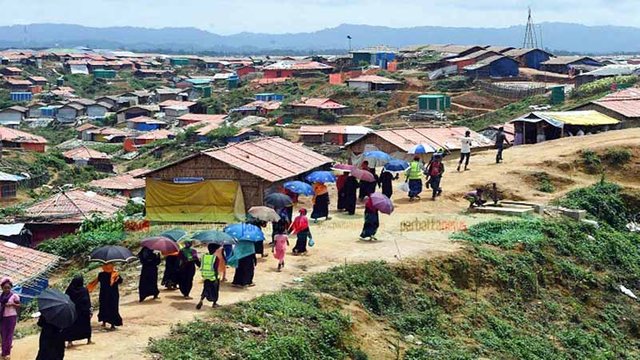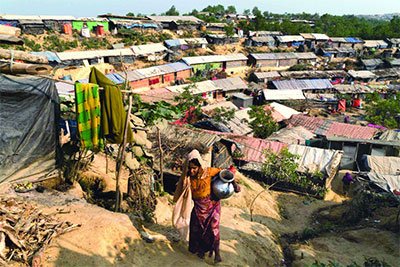Source...

The Rohingyas, who have fled Myanmar and taken refuge in Ukhia-Teknaf, have pushed up the prices of vehicles and basic necessities in the local area. This has brought down a misery in public life. According to a recent survey by a research institute, the prices of vehicles and daily necessities have gone up by up to 50 per cent. On the other hand, the daily wages of the working people have come down, according to the survey.
According to sources, the presence of large numbers of Rohingyas has affected the overall situation of the people of Ukhia-Teknaf. Even misery in the movement of vehicles, the rise in the price of daily necessities has created a miserable situation in many cases. Lost farmland, homesteads of impoverished families. The natural environment and social conditions have been disrupted. Biodiversity, green belt trees have reached the brink of destruction.
According to a recent joint research report by UNDP and the Policy Research Institute (PRI), the presence of large numbers of Rohingyas has raised fears of a major environmental catastrophe. Foreign Minister said in a speech as the chief guest. AK Abdul Momen said, "I am hopeful that the Rohingya repatriation process will start soon. Earlier, Rohingya repatriation was delayed due to Myanmar's role.
According to the research report, the demand for food has increased tremendously after about seven and a half lakh Rohingyas came to Ukhia-Teknaf in Cox's Bazar together in 2016. As a result, the prices of almost all kinds of food items are going up in the area. Before August 2016, the price of coarse rice was Tk 32 per kg, later it was Tk 36. The price of flour was 28 rupees before, later it was 35 rupees. The price of potato was 22 rupees, later it was 30 rupees. The price of salt was 22 rupees, later it became 25 rupees. The average price of different types of vegetables was 25 rupees per kg, later it became 30 rupees. The price of beef per kg was 440 rupees, now it is 500 rupees. The price of different types of fish was earlier 130 rupees per kg, later it was 150 rupees.
https://encrypted-tbn0.gstatic.com/images?q=tbn%3AANd9GcTm7bsMBY22Kaf-blb2pxDfVrRd9u2bTegHPQ&usqp=CAU

In addition to this, the daily wage of the working people has also come down - mentioning in the report that before August 2016, the average daily income of an agricultural laborer and other day laborers was 418 rupees. That income has decreased and now stands at 356 rupees. Overall, the income of day laborers in Teknaf Upazila decreased by 11.28 percent, in Ukhia Upazila it decreased by 16.41 percent and in other parts of Cox's Bazar district it decreased by 6.8 percent.
In this area, 2,500 families are living below the poverty line and more than 1,300 families have become extremely poor. According to the report, about 5,500 acres of protected forest have been cleared and about 1,500 acres of forest have been damaged.
M Gafur Uddin Chowdhury, general secretary of the Rohingya Repatriation Struggle Committee and chairman of Palangkhali UP, said the arrival of large numbers of Rohingyas has had a major impact on the overall situation in Ukhia. The social and natural environment, including daily necessities, has been severely damaged. This misery has come down in the case of traffic. He said there was no way to get rid of this except to repatriate the Rohingya to Myanmar as soon as possible.
Salam,
tim #meuseuraya-teamindonesia01